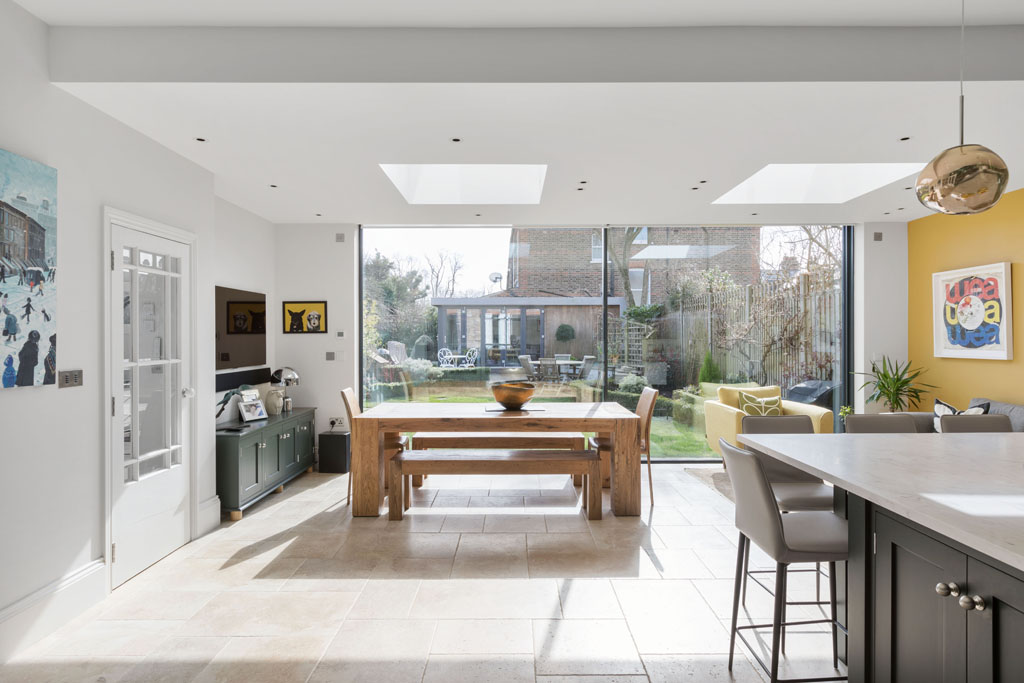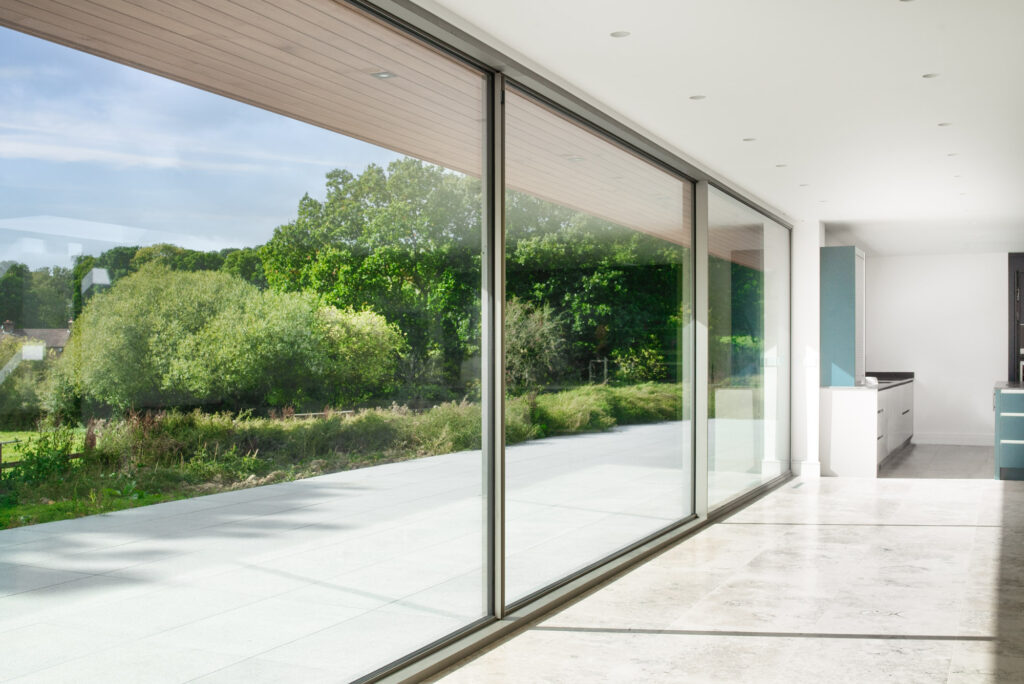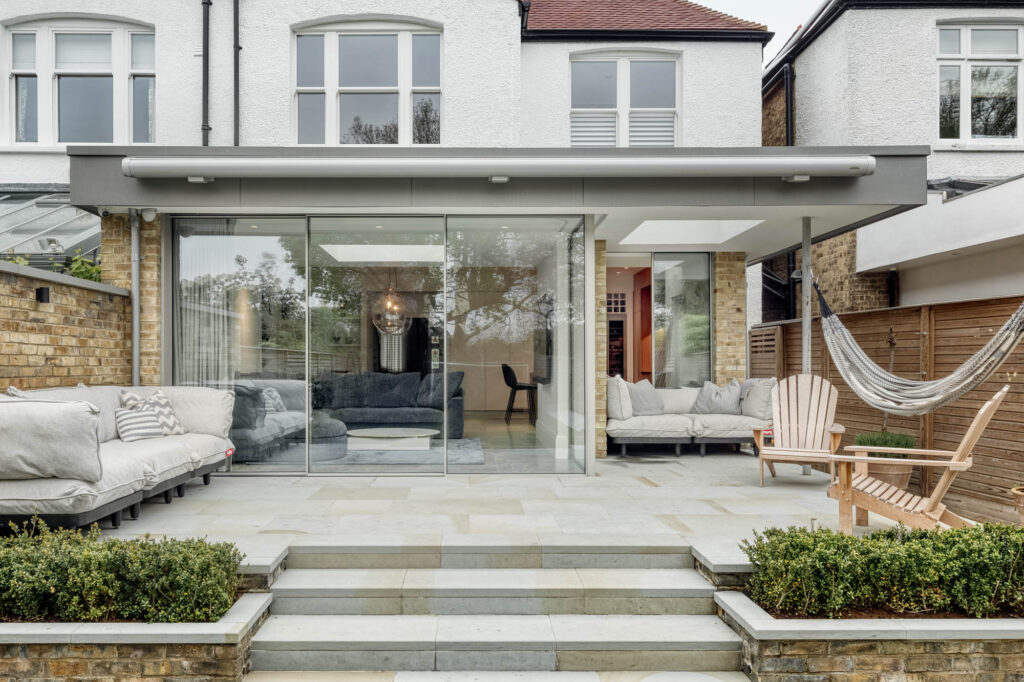In the depths of winter, when the days are short and the light is weaker, it’s rarely a concern. However, in high summer, when the sun is at its most intense, the question of how to control too much sunlight in a garden room or kitchen is important to consider when thinking about installing patio doors.
Glass installations such as sliding or patio doors are designed to help blur the division between the inside and outside, creating constant connection between the house and garden. They also greatly increase the amount of natural light entering a room. However, with that comes the potential increase in the amount of solar radiation that builds up in a home.

Over 4.6 million homes in the UK experience some kind of summertime overheating, a study by Loughborough University revealed in 2021. The research team found that overheating was more prevalent in bedrooms at night rather than living rooms during the day. However, with global temperatures generally on the rise, the effects of sunlight need to be factored in when planning any kind of project with extensive glazing.
Solar glare is the industry term which describes the intense brightness and reflection caused by sunlight. Solar gain, meanwhile, is the amount of heat that is absorbed by a building from sunlight—this can lead to overheating and require extra energy resources in order to cool the space.
Sunlight can be divided into three parts: ultra-violet rays, infra-red radiation and visible light. It’s the infra-red radiation that causes overheating in highly glazed rooms as objects absorb the wavelengths and emit heat which is then contained within the space. The other impact of unfiltered sunlight is that it has the tendency to bleach furniture and paintings.
As a first step, it’s important to bear in mind the orientation of the room before specifying glass patio doors. With any room facing due South or South-West, it’s sensible to consider some kind of measure to counteract solar glare and gain.
Let’s look at glazing options first. At Minima Sliding, we offer four types of glass (setting aside laminated glass for now). Understanding these will help when it comes to managing the impact of too much sunlight in a room. There are two terms which are helpful to know: the u-value measures how well glass insulates a room while the solar factor (also called the g-value) measures the percentage of heat that passes through the glass.
The overall u-value for our standard double glazing is 1.2 and solar factor is 66. Double glazing with solar glass reduces the u-value to 1.1 and the solar factor to 36. We also offer an upgrade to triple glazing, which reduces the u-value down to 0.7 and solar factor to 42. For more exposed rooms, you can opt for triple glazing with solar glass. Here the u-value is 0.6 and the solar factor is 31. For more information about specifications, download our latest brochure.

Next is also the option to install internal blinds or curtains. The choice is down to aesthetics. Curtains offer the opportunity to bring some colour or pattern into a room. While some feel they might conflict with the contemporary nature of glazed patio doors or obscure light from coming inside, ones with very straight soldier pleats which don’t pool on the floor will frame the doors well. Look for a fabric with some kind of structure to maintain a clean finish (linen, for example, would be too loose).
The other solution, and one which has a minimal impact on the amount of natural light coming into the room, is blinds. While we don’t supply blinds ourselves, at Minima Sliding we can supply the recessed blind box or indeed recommend other suppliers. If going down this route, it’s important to plan the blinds in early during the design of the new patio doors so that the track can be recessed into the ceiling. Ideally, have these on a motorised track so that the blinds rise to the same level. That means the roll won’t be seen while the blinds are open, resulting in a seamless finish.
In very sunny countries, many are turning to louvered roofs—an aluminium frame that contains louvres which can be rotated automatically to create the necessary shading. In this country, we’d recommend choosing an awning that can be fully retracted so that it doesn’t impact the amount of natural light entering the room when it’s not in use.
Depending on the size of patio, and the orientation, some clients opt to install a permanent structure outside which extends the time that the patio can be used and means you can still eat outside even during wet weather, but just remember these will likely restrict the amount of sunlight entering through the patio doors.

Need help with your extension or garden room project? Contact us now to find out more about Minima Sliding’s award-winning, slimline patio doors.